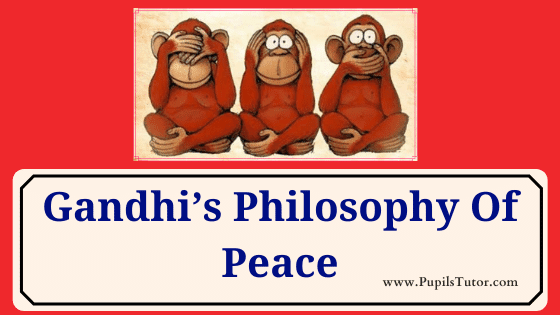
Gandhi’s Philosophy Of Peace
Mahatma Gandhi was an advocate of interstate fellowship and goodwill. Gandhiji’s view on peace emphasizes positive concepts of peace, like
- Empathy,
- Nonviolence,
- Community,
- Forgiveness,
- Proactive peacemaking and
- Discovery of one’s own and other’s truths.
The most fundamental philosophy and the principle of peace according to Gandhiji is “Ahinasa” (Nonviolence) which is essentially Law of life, love & creation as opposed to hatred, violence, destruction, and Death.
Nonviolence, as practiced by Gandhi, is a weapon not of the weak, but of the strong and fearless.
One of the important beliefs of Gandhiji is in the ‘Dharmic Law’ which imposes a moral obligation on states as well as individuals.
According to Mahatama Gandhi,
The Universal Human values of Ahimsa ought to be cultivated not merely at a personal level, but at social, national and international levels for avoiding personal, social, national, and international conflicts.
Gandhiji desire
- To settle disputes at the level of the parties concerned, and
- Assent to the idea of ‘One World’ provided it incorporates his concept of ‘Nonviolence’ and ‘Truth’.
Mahatma Gandhi worked, lived, fought & died for
- Peace, Respect, and Equality for all humans,
- Respect and Tolerance for all ethnic groups and religious faith.
- Meaningful settlement of difference.
Gandhi observed “Fasting unto death” is the last step to oppose injustice. Gandhi’s approach is ethical, as he believes that moral degeneration is the root cause of all evils including conflicts.
Tags:
Discuss The Gandhi Philosophy Of Peace Education Notes
Gandhi’s Philosophy Of Peace Notes For B.Ed In English Medium
(What Did Mahatma Gandhi Said About Peace? | What Is The Main Belief Of Gandhian Philosophy Of Peace) Notes And Study Material, PDF, PPT, Assignment For B.Ed 1st and 2nd Year, DELED, M.Ed, CTET, TET, Entrance Exam, All Teaching Exam Test Download Free For Peace Education Subject.
Check Also:


Share You Thoughts And Suggestions In The Comment Box